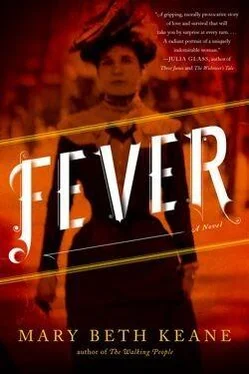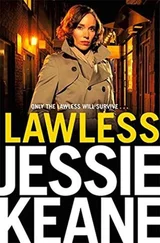“Aren’t you gonna tell me not to swear to God?”
“What?” Mary said and felt as if she had to shake herself awake. “What are you?” She thought she detected an accent in certain words, but she couldn’t pin it down.
“All American,” he said, and opened his arms wide. Every time he moved, a fine layer of black dust drifted down to the step where they were standing. He lowered his arms. “German. But I’ve been here since I was six.”
“And how old are you now?”
“You ask a lot of questions.” He seemed amused. “Twenty-two. You?”
“Seventeen.”
He looked at Mary that day, bright green eyes rimmed with lashes as black as the coal in his bin, and for a few seconds Mary no longer cared if someone came up the hall and spotted them through the glass. His work shirt was unbuttoned at the very top, and underneath, the neck of his undershirt had gone black with soot. When he took off his clothes at the end of the day, there would be parts of him that could not be scrubbed clean, and other parts that were pure white.
“Which door is it, then?”
Mary pointed to the servants’ entrance, which also served for house deliveries, especially deliveries of dirty things, like coal, or things that might drip, or have an odor, or in general any type of thing that the family would prefer not to know about. Just inside the servants’ door was the chute where any coal man would know to send the black stones down to the cellar.
“They like to know their beds are warm, their underwear clean, but they don’t like to know how it gets that way.”
Alfred raised an eyebrow. “That’s cheeky.”
Mary didn’t know why she’d said it out loud, but now that she had she couldn’t disown it. She hadn’t expected a reprimand, especially not from a man who’d left a trail of coal that someone else would have to sweep away. Not even sweep, Mary corrected herself, remembering how coal dust smeared and spread further when wiped. She’d probably have to fill a bucket and drag it out there to splash the dust away. The work that would be, and in this cold. Mary was tired of having wet, cold hands in wet, cold weather.
“It was cheeky of you to ring this bell,” Mary said. “Use your head. Does any family take a coal delivery through the front door?”
Alfred shrugged, but Mary noticed the skin around his collar become mottled. “I told you I’m covering.”
Mary leaned over the rail and again pointed out the lower door, almost around the side of the house but not quite. As she leaned, he also leaned, to see what she was seeing, and Mary felt the rough cloth of his work shirt against the thin cotton at her back. She sensed the body within, solid and strong. “There,” she said, and when she looked back at him over her shoulder he wasn’t looking toward the door at all. Mary worried about the lamb’s blood she’d wiped on her apron, about Mr. Mott’s twelve dress shirts that had to be soaked, rinsed, dried, pressed, and hung, and about him, this grown man, who even on a cold, wet day seemed to give off warmth like a flagstone in summer, long after the sun goes down.
Still with that half smile, he took both handles of the coal bin, heaved it up with a forward thrust of the hips, and made his way to the far door.
“I’ll see ya, Miss,” he said. Inside, with the doors closed tight, Mary listened to hard knots of anthracite slide along the metal throat of the chute, the crunch of his large tin scoop driven into the pile again and again.
• • •
Saturday morning was overcast, and the skies threatened to storm. When she woke and smelled rain in the air she told herself not to be disappointed if he didn’t come. The ferries wouldn’t run if the waters were too rough, and it wouldn’t be his fault. But when she went outside to see if she could spot the dock through the fog, everything seemed to be running as usual. John Cane stepped out of the mist and onto the path just before Mary, with a covered plate in his hand.
“Everything all right?” he inquired, peering at her unusual hairstyle.
“Fine.” She took the plate, peeked under the lid, and sighed. After two and a half years she was getting to the point where she would mug someone for a good plate of eggs and rashers. “Are the ferries operating on time?”
“They are,” John said, putting one foot. “Why? Expecting someone? That lawyer?”
“You are the nosiest person I ever knew in my life.”
“Your man?”
“I don’t put it that way, but yes.”
“What kind of name is Alfred anyway? What’s his surname?”
“Briehof. It’s German.”
“What part of Germany?”
“John, do you have any work to do today? Are you paid to work, or just to visit?”
“I just like to know things is all.”
“Doesn’t everyone? But not everyone thinks it’s right to ask.”
“Not everyone. That’s true. Take you for example. You’ve hardly asked me a single thing.”
“Okay, tell me something about yourself.”
But John just shrugged and walked back up to the hospital.
• • •
Mary saw him before the ferry docked. She saw his dark head swaying with the rhythm of the water. She watched him leap from the boat to the pier without the assistance of the handrail. She watched him say something to the ferry’s captain, and then both men wheeled around to face Mary’s bungalow. She lifted her arm and waved.
They walked toward each other. He leaned in to kiss her when they met on the path, but she told him to wait, not yet, she’d say when. He looked so good, and so young, and so healthy. His teeth were clean and white. His neck was shaved close without a single nick. He was tall. He moved with the ease of a man who was well fed, and well washed, and had full use of his lungs and got physical exercise every day. So this is how she appeared to the patients of the hospital. This was the light they were looking at when they sat, wrapped in blankets and propped up on hospital benches and stared at her, struggling to recall what being fully alive was like. Mary and Alfred, they weren’t as young as they once were, but they weren’t so bad, not so bad at all. She pointed out the hospital building, the chapel, the coal house, the male dormitory, the morgue, the nurses’ quarters, the physicians’ quarters, the lighthouse, the female dormitory, the stable, the sheds, and her own little shack, which she promised to show him later. She led him down the path that John Cane had cleared for her, down to the beach and her snowy egret. They found a damp log to sit on, and she pointed out the Bronx to their left, and to their right South Brother and Rikers. To their far right was Astoria, and behind them, of course, was Manhattan. She asked him if North Brother was as he had pictured it.
“No,” he said. “There’s more here than I thought. It’s like its own little village. And yet…”
“What?”
“It’s still empty. Where is everyone?”
“They’re patients. Most of them will die here. Or they work here, and they go home at night.”
Mary waited for him to kiss her again, but the moment seemed to have passed. He seemed darker now, caught up in thoughts of his own, and she worried that he regretted coming, that he’d come up with an excuse to leave.
“How are things at the ice company?”
He didn’t seem to hear her. “What’s to stop you from getting on the ferry one day and going over? Disappearing? Couldn’t you work under another name?”
“The guards, for a start. The ferry captain. It’s always the same man, and he knows me.”
“You could hide. You could wait for a moment when he’s not looking and then hide on the boat, under the bench, and then sneak off on the other end when he’s occupied with something.”
Читать дальше












